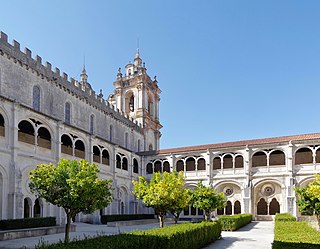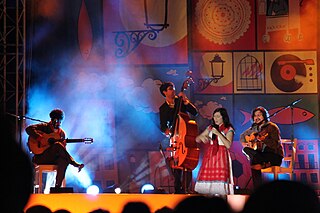
Alcobaça is a Portuguese city and municipality in the Oeste region, in the historical province of Estremadura, and in the Leiria District. The city grew along the valleys of the rivers Alcoa and Baça, from which it derives its name. The municipality population in 2011 was 56,693, in an area of 408.14 square kilometres (157.58 sq mi). The city proper has a population of 15,800 inhabitants.

Dom John V, known as the Magnanimous and the Portuguese Sun King, was King of Portugal from 9 December 1706 until his death in 1750. His reign saw the rise of Portugal and its monarchy to new levels of prosperity, wealth, and prestige among European courts.
Canada Post Corporation, trading as Canada Post, is a Crown corporation that functions as the primary postal operator in Canada. Originally known as Royal Mail Canada, rebranding was done to the "Canada Post" name in the late 1960s, even though it had not yet been separated from the government. On October 16, 1981, the Canada Post Corporation Act came into effect. This abolished the Post Office Department and created the present-day Crown corporation which provides postal service. The act aimed to set a new direction for the postal service by ensuring the postal service's financial security and independence.

The postal and philatelic history of Canada concerns postage of the territories which have formed Canada. Before Canadian confederation, the colonies of British Columbia and Vancouver Island, Prince Edward Island, Nova Scotia, New Brunswick and Newfoundland issued stamps in their own names. The postal history falls into four major periods: French control (1604–1763), British control (1763–1841), colonial government control (1841–1867), and Canada, since 1867.

Pedro Nunes was a Portuguese mathematician, cosmographer, and professor, from a New Christian family.
Silva is a surname in Portuguese-speaking countries, such as Portugal and Brazil. It is derived from the Latin word silva, meaning "forest" or "woodland". It is the family name of the House of Silva.

Maia is a municipality in the Porto Metropolitan Area, Grande Porto subregion, in Norte Region, Portugal. It is located 11 km north of central Porto. The population in 2011 was 135,306, in an area of 82.99 km2 (32.04 sq mi). There is one city and three towns in the municipality.

José Bonifácio de Andrada e Silva was a Brazilian statesman, naturalist, mineralist, professor and poet, born in Santos, São Paulo, then part of the Portuguese Empire. He was one of the most important mentors of Brazilian independence, and his actions were decisive for the success of Emperor Pedro I. He supported public education, was an abolitionist and suggested that a new national capital be created in Brazil's underdeveloped interior. His career as naturalist was marked by the discovery of four new minerals.

Maria Helena Vieira da Silva was a Portuguese abstract painter. She was considered a leading member of the European abstract expressionism movement known as Art Informel. Her works feature complex interiors and city views using lines that explore space and perspective. She also worked in tapestry and stained glass.
Portuguese Canadians are Canadian citizens of full or partial Portuguese heritage or people who migrated from Portugal and reside in Canada. According to the 2016 Census, there were 482,610 or 1.4% of Canadians claimed full or partial Portuguese ancestry, an increase compared to 410,850 in 2006. Most Portuguese Canadians live in Ontario - 282,865 (69%), followed by Quebec 57,445 (14%) and British Columbia 34,660 (8%).

Amélie of Leuchtenberg was Empress of Brazil as the wife of Pedro I of Brazil.

Bernardo Joaquim da Silva Guimarães was a Brazilian poet and novelist. He is the author of the famous romances A Escrava Isaura and O Seminarista. He also introduced to Brazilian poetry the verso bestialógico, also referred to as pantagruélico — poems whose verses are very nonsensical, although very metrical. Under the verso bestialógico, he wrote polemical erotic verses, such as "O Elixir do Pajé" and "A Origem do Mênstruo". A non-erotic poem written in verso bestialógico is "Eu Vi dos Polos o Gigante Alado".
Lusitanosaurus is a genus of large basal thyreophoran dinosaur from the Sinemurian stage of Early Jurassic of Portugal. It is the second example of the group from the Lower Jurassic of Europe and it is the oldest known dinosaur from the Iberian Peninsula. It is based on a large left maxilla with teeth that was lost in the fire at Museu Nacional de História Natural e da Ciência, Lisbon, in 1978.

Luís da Silva Mouzinho de Albuquerque was a Portuguese military officer, engineer, poet, scientist and politician, who distinguished himself during the Liberal Wars and in the conflicts that marked Portugal's history in the first half of the 19th century. He served as the Minister of the Kingdom during the liberal regency of Pedro of Braganza. This was the most prominent post inside the government at that time, which made him the Prime Minister of Portugal in all but name. He was also several times minister and deputy minister during the Constitutional Monarchical period. Among other offices, he served as Chief of the National Mint, captain-general and governor of Madeira, and inspector-general of public works. He was the grandfather of Joaquim Augusto Mouzinho de Albuquerque, a military officer and colonial administrator.

Mathieu da Costa was an Afro-French member of the exploring party of Pierre Dugua, the Sieur de Monts, and Samuel de Champlain that travelled from France to the New World in the early 17th century. He was the first recorded free black person to arrive on the territory of today's Canada.
Pedro Silva may refer to:

Amador Bueno was a landowner and colonial administrator of the Captaincy of São Vicente.

Deolinda is an acoustic Portuguese "neofado" group, whose music often deals with social and political commentary. Founded in 2006, their first album was released in 2008, which went double platinum. Their second was in the top ten in Portugal for over fifteen weeks. They have toured the United States, Canada, and Europe and have played at festivals such as the World Music Expo, Mawazine and the Festival Internacional Cervantino.

José Bonifácio de Andrada e Silva was a French-born Brazilian poet, teacher and senator. He is known as "the Younger" to distinguish him from his grand-uncle, José Bonifácio de Andrada e Silva, "the Elder" or "the Patriarch", a famous statesman who was one of the most important mentors of Brazilian independence.
Maluda (1934–1999) was a Portuguese painter. Her work was mainly based on portraits and city views, namely the painting of urban landscapes, windows and various other architectural elements. She achieved particular popularity as a designer of Portuguese postage stamps.















